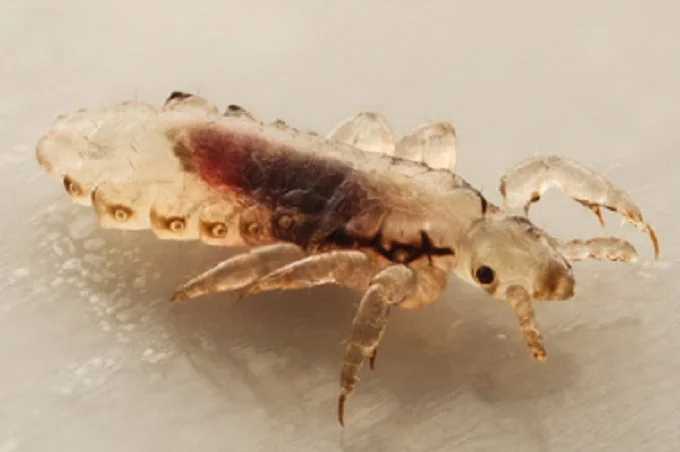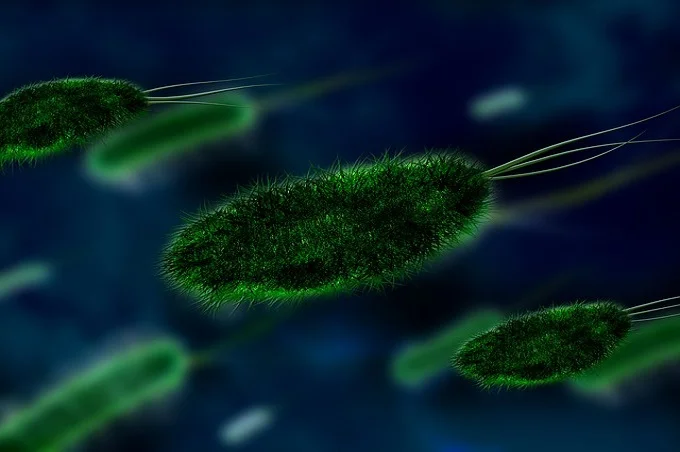It’s been a long time since we’ve had really disgusting topics where one headline is enough to make you lose sleep. Yes, if you didn’t know, there are many microscopic creatures living in your body that you used to think about with disgust.
1. Human lice

Human lice are divided into head, body, and body lice. The first and third settle on the hair and do not carry diseases, but the latter is dangerous, as they can infect a person with typhus, pediculosis, “trench fever,” and other diseases. To get the latest stories, install our app here
And yet, most lice are not dangerous; they drink blood, causing itching and burning. Usually, lice are found in children, but they can also appear in adults, and even those who observe hygiene, most often through contact with an infected person.
To protect yourself from these insects, take a shower regularly, change your underwear and bed linen more often, wash them at high temperatures, iron your clothes and other linen with a hot iron, and do not use other people’s hygiene items.
2. Hookworms
Hookworms most often affect people in the tropics and subtropics, so you can pick up these parasitic roundworms if you are on a trip to Thailand or Vietnam. Moreover, it is enough for infection to touch the open skin to the habitat of worms, such as walking barefoot along the beach.
As for the introduction, these creatures enter the body through the skin, which causes burning, itching, and redness at the point of entry. Hookworms secrete enzymes that destroy the intestines’ walls and prevent blood clotting. To get the latest stories, install our app here
This leads to indigestion, pain, taste perversion, general weakness, and other health problems. The U.S. Centers for Disease Control and Prevention estimates that as many as 740 million people worldwide are infected with this parasite.
3. Tapeworms
A real classic, the very creatures that we imagine every time we say the word “parasite.” Tapeworms enter the body through infected pork, beef, or fish, and other products contaminated with the eggs of these creatures and can reach a length of up to 30 meters.
For a long time, you can not notice the presence of the parasite, and all that will say about the infection is a violation of the intestines and weight loss.
4. Human Demodex Mite
Human Demodex Mites are parasitic mites that live in or near hair follicles. They often live on the eyelashes, which is why they are called “eyelash mites.” Two species are dangerous to humans: Demodex folliculorum and Demodex brevis.
As a rule, people do not notice these mites because their bodies are transparent, and they do not cause any symptoms that would indicate a parasite infection as they feed on dead skin cells. But sometimes, if immunity is reduced, they can cause demodicosis, which manifests itself in the form of itching, burning and inflammation on the skin.
5. Intestinal Giardia
Intestinal Giardia is a tiny parasite that most commonly infects cats, dogs, birds, and some wild animals. Upon contact with an infected animal, as well as when eating contaminated food or water from untreated sources, Giardia enters the body, where they are either in a vegetative form, fixed in the upper sections of the small intestine, or in the form of a cyst, and then it passes into the large intestine. To get the latest stories, install our app here
Intestinal Giardia can cause weight loss, flatulence, Lazy bowel, and cramps. Often they do not show any symptoms, making it difficult to diagnose a parasite infestation. Even if you wash your food well and drink only water from the filter, this does not give one hundred percent safety because Giardia was found even in chlorinated water.
6. Candida
Candida is a genus of yeast that is an endosymbiont of host creatures, including humans. Usually, they do not appear and are part of the normal microflora of the mucosa. But with a decrease in general or local immunity, they multiply in large numbers. In addition, more pathogenic strains can enter the body, leading to candidiasis, better known as thrush.
Depending on the mucosa, candida causes various symptoms. But in general, even after treatment for thrush, candida remains in the body and continues to wait for the next failure in immunity due to illness, stress, or another factor. To get the latest stories, install our app here
7. Bellybutton bacteria
Why is there such a variety of bacteria in this place? The thing is that sweat, fat and other substances are retained in the folds of the navel, which are an excellent breeding ground for many microorganisms. So, maybe right now, in your navel, several kinds of microscopic creatures are having a swing party after a heavy dinner. To get the latest stories, install our app here
However, they may assist in the battle against more hazardous bacteria in this situation. Gender, bodily composition, where you live, and your genes may influence which bacteria you have and how much of it you have.
8. Gut bacteria
This is the case when cooperation is mutually beneficial. Bacteria that live in the gut are integral to metabolism and produce beneficial substances that help the body function. In return, they receive food and a comfortable environment for life and reproduction. The average adult human body contains about 0.2 kilograms of bacteria.
9. Lactobacilli
Lactobacilli are anaerobic bacteria that convert lactose and other carbohydrates into lactic acid, playing an important role in the body’s life. In both s3xes, they are present in the intestines, and in girls, they also live in the vag!na, representing its main microflora. They are a kind of barrier to bacteria from the outside, preventing them from entering the intestine or vag!na. To get the latest stories, install our app here
10. Staphylococci
This is one of the most common bacteria that lives comfortably in the nasopharynx and on the skin, for example, in the axillary region. Staphylococci are part of the normal skin microflora and, as a rule, do not interfere with human life. But there are also more pathogenic bacteria, such as Staphylococcus aureus, which cause purulent inflammatory processes. According to experts, this bacterium carries up to 40% of the world’s population.
With reduced immunity and untreated, Staphylococcus aureus can lead to both mild diseases, such as acne and boils, and severe ones, such as pneumonia and meningitis.
Staphylococcus aureus can be one of the main candidates for the destruction of mankind because due to the uncontrolled use of antibiotics, drug-resistant strains appear.
